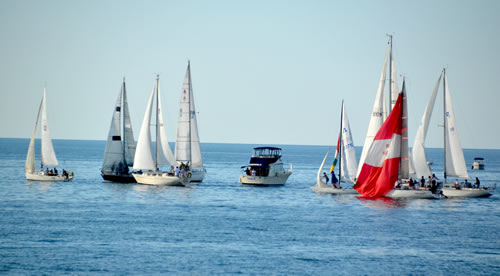2 congressmen continue opposition to lake-level plan

Photo by Tom Rivers: These boaters are out in lake Ontario near the Oak Orchard Harbor on June 30, 2016.
Press Release, Congressman Chris Collins
WASHINGTON, D.C. – Congressman Chris Collins (NY-27) and Congressman John Katko (NY-24) continued to voice their strong opposition to the International Joint Commission’s (IJC) Lake Ontario-St. Lawrence River Plan for the 2016 Fiscal Year after receiving a briefing on Wednesday from federal officials involved in the plan’s implementation.
“The IJC’s Plan 2014 will devastate homeowners and businesses along Lake Ontario’s shoreline,” said Congressman Chris Collins, R-Clarence. “This plan is an example of government decision-making at its worst. The plan fails to take into account the devastating economic impact it will have on our lakeshore communities, and doesn’t adequately protect our eroding shore-line. I remain vehemently opposed to this ill-conceived plan and will do everything in my power to ensure it does not receive the funding needed for its implementation.”
“It is deeply disappointing that the Administration continues to push Plan 2014 without properly consulting with the people who would be most directly affected by it,” said Congressman John Katko, R-Camillus (near Syracuse). “My lakeshore constituents have voiced concerns for years about the potentially devastating impact this Plan could have on their communities, but have not had their concerns addressed, or even meaningfully acknowledged. Until the Administration directly addresses the concerns of my constituents, I will do everything in my power to stop Plan 2014.”
Staff Members from the Council on Environmental Quality, the Department of Commerce, the Department of the Interior and the State Department were present at Wednesday’s briefing.
Also known as Plan 2014, the Lake Ontario-St. Lawrence River Plan would require federal funds to increase the frequency by which Lake Ontario’s water levels are raised and lowered. Plan 2014 would raise the current maximum water levels by 2.4 inches, significantly increasing the annual costs of shoreline maintenance. Local residents are concerned about the negative impact this plan will have on Lake Ontario’s already rapidly deteriorating shoreline. These water level changes will also threaten the economic activities of residents, businesses, and farms which rely on consistent lake water levels.
Local legislators also reaffirmed their strong opposition to the plan.
“If Plan 2014 goes through, every taxpayer in our lakeshore counties will suffer because everyone has to make up the difference in the loss of sales tax revenue from our fishing industry, recreational boaters, and the devaluation of lakeshore property on the south shore of Lake Ontario,” said David Godfrey, Niagara County Legislator. “This is not only a shoreline issue; taxpayers will have to pay the price for this totally irresponsible plan.”
“The approval by the IJC (International Joint Commission) of Plan 2014 is government at its worst. The IJC did not listen to the voice of people,” said Lynne Johnson, Orleans County Legislator. “This plan is going to be economically devastating for our entire area. There appears to be no interest from the IJC to assist with what will be the equivalent of a manmade disaster, with no economic mitigation to our lakeshore communities.”
“Plan 2014 is based on inconclusive data and speculation,” said Steve LeRoy, Sodus Town Supervisor and Chairman of Wayne County Board of Supervisors. “Hundreds of houses, roads, bridges, wastewater plants, public water lines and countless businesses have been built based on the current Order that was implemented nearly 60 years ago. No one person or group should feel so empowered that they could disregard that Order at this point in time and force massive hardship on our communities. Plan 2014 violates an international treaty, it places 100% of the losses on the south shore of Lake Ontario and if implemented, will guarantee a “man-made” multi-million dollar catastrophe. The possible benefits simply do not outweigh the inevitable losses.”








































































